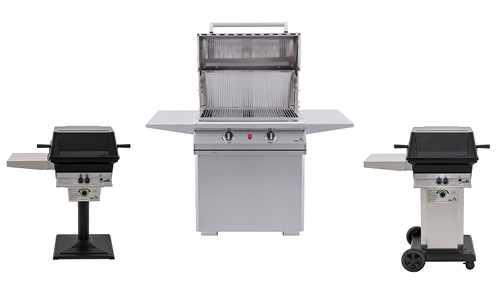11-minute read
|
Grills
When it comes to selecting the perfect patio grill, the choice of fuel can significantly impact your experience in terms of ease of use, installation, portability, and compliance with building codes. For professionals in the construction industry, developers, or owners of multi-family homes such as apartments and condos, understanding the distinctions between natural gas, propane, and electric grills is essential for making the best possible choice. In this article, we will delve into the advantages and disadvantages of each fuel type, helping you decide which one suits your needs best. Natural gas grills are a go-to choice for many users because of their reliability and user-friendliness. Since they are directly connected to your home's natural gas line, there’s no need to stress about running out of fuel or refilling tanks. Once set up, these grills provide a steady stream of gas, making them highly convenient. However, because they are permanently attached to a gas line, natural gas grills lack portability. Propane grills are celebrated for their mobility. The fuel is stored in a removable propane tank that connects to the grill, allowing you to relocate the grill easily. This flexibility is ideal for spaces where you may need to store the grill away when not in use or for situations where you want to grill in areas without access to a natural gas line or electricity. The only drawback is the need to regularly replace or refill the propane tank, though this minor inconvenience is outweighed by the grill's versatility (having backup tanks on hand can alleviate this issue). Electric grills are gaining popularity, especially in urban areas with strict regulations on gas and propane appliances, or where newly constructed buildings are required to use all-electric appliances. Our e-grill plugs into a NEMA 6-30 receptacle, similar to those used for large appliances like washing machines and dryers. Although this means the grill cannot be moved easily, it offers an eco-friendly alternative, particularly if your city’s electricity is sourced from renewable energy. Additionally, our electric grill is crafted from stainless steel, ensuring it resists rust and corrosion. Natural Gas Grills in Multi-Family Settings: For multi-family properties with shared outdoor spaces, natural gas grills are an excellent choice. They offer the convenience of a continuous fuel supply, making them ideal for frequent use without the hassle of replacing fuel tanks. Propane Grills for Flexibility: If your property demands more adaptability, portable propane grills are a fantastic option. Their portability lets you store them away when not in use and move them to different locations as needed. This is especially useful for properties with small patio areas or grill zones without access to natural gas or electricity. Electric Grills for Compliance and Eco-Friendliness: With growing regulations on gas and propane grills, electric grills are becoming a necessity in many regions. They’re perfect for properties focused on sustainability and those needing to adhere to local ordinances. Our stainless steel e-grill is not only eco-friendly but also durable and rust-resistant, making it a long-lasting solution for any multi-family property. Natural Gas Grills: These grills are ideal for properties seeking a permanent, hassle-free grilling option. We offer a variety of cast-aluminum and stainless steel natural gas grills designed for easy installation and continuous use. Propane Grills: These grills are easy to move and store, making them a versatile choice. Our propane grills come in various cast-aluminum and stainless steel designs, offering the portability and flexibility required for multi-family properties. Electric Grills: Our new electric grill, made from stainless steel, provides an eco-friendly and durable option for properties aiming to comply with local regulations. Our electric grill matches the dimensions of our S27T commercial grill model, making it a seamless fit for custom outdoor countertops. Selecting the ideal patio grill for your property involves weighing convenience, fuel type, and environmental impact. Whether you choose natural gas, propane, or electric, each fuel type offers distinct benefits tailored to different needs. For further details on our products or to discuss your specific requirements, feel free to contact us today. Let us assist you in finding the perfect grill for your property! Need more information? Have questions? Contact us today, and we’ll be happy to assist you! Rice Husks Baling Machine,Hydraulic Rice Husk Baler Machine,Rice Husks Bagging Press,Rice Husk Packing Machine DILOYA GROUP CO.,LTD. , https://www.diloyacn.comComparing Natural Gas, Propane, and Electric Grills for Your Patio

Exploring the Different Fuel Options for Outdoor Grills
Natural Gas Patio Grills
Portable Propane Patio Grills
Electric Patio Grills
In-Depth Comparison of Fuel Types
Convenience and Installation
Eco-Friendliness
Cost Considerations
Real-World Applications for Multi-Family Properties
Our Product Range
Choosing the Right Grill
Key Factors to Consider
Our Recommendations
Compare Natural Gas vs Propane vs Electric for Patio Grills
Go Back To Blog